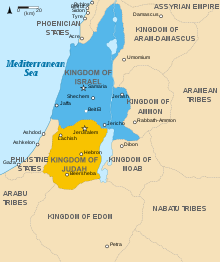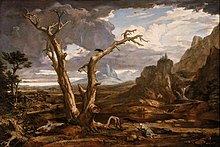Elijah appeared at the Transfiguration of Jesus.

Elijah (/ɪˈlaɪdʒə/ ih-LY-jə; Hebrew: אֵלִיָּהוּ, Eliyahu, meaning "My God is Yahweh[1]/YHWH"[2][3]) or latinized form Elias (/ɪˈlaɪəs/ ih-LY-əs)[a] was, according to the Books of Kings in the Hebrew Bible, a prophet and a miracle worker who lived in the northern kingdom of Israel[4] during the reign of King Ahab (9th century BC). In 1 Kings 18, Elijah defended the worship of the Hebrew God over that of the Canaanite deity Baal. God also performed many miracles through Elijah, including resurrection (raising the dead), bringing fire down from the sky, and entering Heaven alive "by fire".[5] He is also portrayed as leading a school of prophets known as "the sons of the prophets".[6] Following his ascension, Elisha, his disciple and most devoted assistant took over his role as leader of this school. The Book of Malachi prophesies Elijah's return "before the coming of the great and terrible day of the LORD",[7] making him a harbinger of the Messiah and of the eschaton in various faiths that revere the Hebrew Bible. References to Elijah appear in Ecclesiasticus, the New Testament, the Mishnah and Talmud, the Quran, the Book of Mormon, the Doctrine and Covenants, and Bahá'í writings.
In Judaism, Elijah's name is invoked at the weekly Havdalah rite that marks the end of Shabbat, and Elijah is invoked in other Jewish customs, among them the Passover Seder and the brit milah (ritual circumcision). He appears in numerous stories and references in the Haggadah and rabbinic literature, including the Babylonian Talmud.
The Christian New Testament notes that some people thought that Jesus was, in some sense, Elijah,[8] but it also makes clear that John the Baptist is "the Elijah" who was promised to come in Malachi 3:1;4:5.[9] Christian doctrine says that Elijah appeared with Moses during the Transfiguration of Jesus.
In Islam, Elijah appears in the Quran as a prophet and messenger of God, where his biblical narrative of preaching against the worshipers of Baal is recounted in a concise form.[10] Due to his importance to Muslims, Catholics, and Orthodox Christians, Elijah has been venerated as the patron saint of Bosnia and Herzegovina since 1752.[11]
Biblical accounts

Map of Israel as it was in the 9th century BC. Blue is the Kingdom of Israel. Golden yellow is the Kingdom of Judah.
According to the Bible, by the 9th century BC, the Kingdom of Israel, once united under Solomon, divided into the northern Kingdom of Israel and the southern Kingdom of Judah (which retained the historical capital of Jerusalem along with its Temple). However, scholars today do not always agree as to whether the united Kingdom under Solomon ever existed.[12] Omri, King of Israel, continued policies dating from the reign of Jeroboam, contrary to religious law, that were intended to reorient religious focus away from Jerusalem: encouraging the building of local temple altars for sacrifices, appointing priests from outside the family of the Levites, and allowing or encouraging temples dedicated to Baal, an important deity in ancient Canaanite religion.[13][14] Omri achieved domestic security with a marriage alliance between his son Ahab and princess Jezebel, a priestess of Baal and the daughter of the king of Sidon in Phoenicia.[15] These solutions brought security and economic prosperity to Israel for a time,[16] but did not bring peace with the Israelite prophets, who advocated a strict deuteronomic interpretation of the religious law.
Under Ahab's kingship tensions exacerbated. Ahab built a temple for Baal, and his wife Jezebel brought a large entourage of priests and prophets of Baal and Asherah into the country. In this context Elijah is introduced in 1 Kings 17:1 as Elijah "the Tishbite". He warns Ahab that there will be years of catastrophic drought so severe that not even dew will form, because Ahab and his queen stand at the end of a line of kings of Israel who are said to have "done evil in the sight of the Lord".
1st and 2nd Kings

Elijah in the wilderness, by Washington Allston
No background for the person of Elijah is given except for his brief characterization as a "Tishbite". His name in Hebrew means "My God is Yahweh", and may be a title applied to him because of his challenge to worship of Baal.[17][18][19][20][21]
As told in the Hebrew Bible, Elijah's challenge is bold and direct. Baal was the Canaanite god responsible for rain, thunder, lightning, and dew. Elijah thus, when he initially announces the drought, not only challenges Baal on behalf of God himself, but he also challenges Jezebel, her priests, Ahab and the people of Israel.[22]
Widow of Zarephath[edit]
Main article: Raising of the son of the widow of Zarephath

Elijah reviving the Son of the Widow of Zarephath by Louis Hersent
After Elijah's confrontation with Ahab, God tells him to flee out of Israel, to a hiding place by the brook Chorath, east of the Jordan, where he will be fed by ravens.[23] When the brook dries up, God sends him to a widow living in the town of Zarephath in Phoenicia. When Elijah finds her and asks to be fed, she says that she does not have sufficient food to keep her and her own son alive. Elijah tells her that God will not allow her supply of flour or oil to run out, saying, "Do not be afraid...For thus says the Lord the God of Israel: The jar of meal will not be emptied and the jug of oil will not fail until the day that the Lord sends rain on the earth."[24] She feeds him the last of their food, and Elijah's promise miraculously comes true. God gave her "manna" from heaven even while he was withholding food from his unfaithful people in the promised land. Some time later the widow's son dies and the widow cries, "You have come to me to bring my sin to remembrance, and to cause the death of my son!"[25] Elijah prays that God might restore her son so that the trustworthiness of God's word might be demonstrated. 1 Kings 17:22 relates how God "listened to the voice of Elijah; the life of the child came into him again, and he revived."[26] This is the first instance of raising the dead recorded in Scripture. This widow was granted the life of her son, the only hope for a widow in ancient society. The widow cried, "the word of the Lord in your mouth is truth."[27] After more than three years of drought and famine, God tells Elijah to return to Ahab and announce the end of the drought: not occasioned by repentance in Israel but by the command of the Lord, who had determined to reveal himself again to his people. While on his way, Elijah meets Obadiah, the head of Ahab's household, who had hidden a hundred Jewish prophets from Jezebel's violent purge. Obadiah fears that when he reports to Ahab about Elijah's whereabouts, Elijah would disappear, provoking Ahab to execute him. Elijah reassures Obadiah and sends him to Ahab.
Challenge to Baal
Elijah's offering is consumed by fire from heaven in a stained glass window at St. Matthew's German Evangelical Lutheran Church in Charleston, South Carolina.
When Ahab confronts Elijah, he denounces him as being the "troubler of Israel" but Elijah takes notice of his hypocrisy and tells Ahab that he is the one who troubled Israel by allowing the worship of false gods. Elijah then berates both the people of Israel and Ahab for their acquiescence in Baal worship. "How long will you go limping with two different opinions? If the Lord is God, follow him; but if Baal, then follow him."[28] And the people were silent. The Hebrew for this word, "go limping" or "waver", is the same as that used for "danced" in 1 Kings 18, verse 26, where the prophets of Baal frantically dance. Elijah speaks with sharp irony about the religious ambivalence of Israel.
Elijah proposes a direct test of the powers of Baal and the Jewish God. The people of Israel, 450 prophets of Baal, and 400 prophets of Asherah are summoned to Mount Carmel. An altar is built for Baal. Wood is laid on the altar. An ox is slaughtered and cut into pieces; the pieces are laid on the wood. Elijah then invites the priests of Baal to pray for fire to light the sacrifice. They pray from morning to noon without success. Elijah ridicules their efforts. "At noon Elijah mocked them, saying, 'Cry aloud! Surely he is a god; either he is meditating, or he has wandered away, or he is on a journey, or perhaps he is asleep and must be awakened.'"[29] They respond by cutting themselves and adding their own blood to the sacrifice (such mutilation of the body was strictly forbidden in the Mosaic law). They continue praying until evening without success.
Elijah builds an altar from twelve stones, digs a huge trench around it, lays wood on it, slaughters another ox, cuts it up, and lays it on the wood. He then orders that the sacrifice and altar be drenched with water from "four large jars" poured three times, filling also the trench.[30] He asks God to accept the sacrifice. Fire falls from the sky, consuming the sacrifice, the stones of the altar itself, the earth and the water in the trench as well. Elijah then orders the deaths of the priests of Baal. Elijah prays earnestly for rain to fall again on the land. Then the rains begin, signaling the end of the famine.
Mount Horeb[edit]
Jezebel, enraged that Elijah had ordered the deaths of her priests, threatens to kill Elijah.[31] Later Elijah would prophesy about Jezebel's death, because of her sin. Elijah flees to Beersheba in Judah, continues alone into the wilderness, and finally sits down under a shrub, praying for death. He falls asleep under the tree; the angel of the Lord touches him and tells him to wake up and eat. When he awakens he finds bread and a jar of water. He eats, drinks, and goes back to sleep. The angel comes a second time and tells him to eat and drink because he has a long journey ahead of him.
Elijah travels for forty days and forty nights to Mount Horeb,[32] where Moses had received the Ten Commandments. Elijah is the only person described in the Bible as returning to Horeb, after Moses and his generation had left Horeb several centuries before. He seeks shelter in a cave. God again speaks to Elijah:[33] "What doest thou here, Elijah?". Elijah did not give a direct answer to the Lord's question but evades and equivocates, implying that the work the Lord had begun centuries earlier had now come to nothing, and that his own work was fruitless. Unlike Moses, who tried to defend Israel when they sinned with the golden calf, Elijah bitterly complains over the Israelites' unfaithfulness and says he is the "only one left". Up until this time Elijah has only the word of God to guide him, but now he is told to go outside the cave and "stand before the Lord." A terrible wind passes, but God is not in the wind. A great earthquake shakes the mountain, but God is not in the earthquake. Then a fire passes the mountain, but God is not in the fire. Then a "still small voice" comes to Elijah and asks again, "What doest thou here, Elijah?" Elijah again evades the question and his lament is unrevised, showing that he did not understand the importance of the divine revelation he had just witnessed. God then sends him out again, this time to Damascus to anoint Hazael as king of Aram, Jehu as king of Israel, and Elisha as his replacement.

A statue of Elijah in the Cave of Elijah, Mount Carmel, Israel

The Cave of Elijah, Mount Carmel, Israel#fastitlinks.com
No comments:
Post a Comment